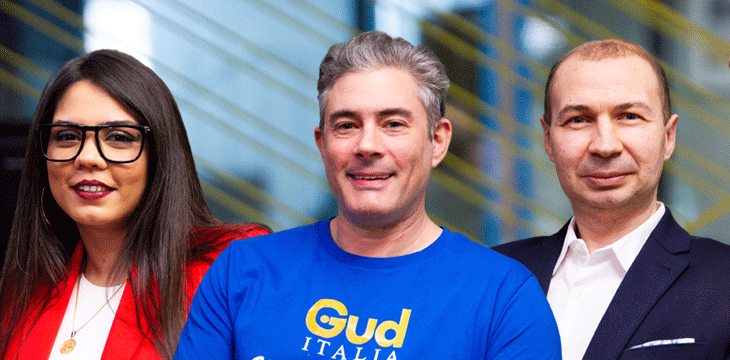|
Getting your Trinity Audio player ready...
|
Entrepreneurs Alyna, Jonathan and Dimitar found new and clever ways to improve the way people work, eat and conduct business. While all come from different backgrounds, together they share a common vision: using blockchain technology to leverage their business platform.
Pakistani entrepreneur Alyna Butt wants to revamp the overall work experience through Squadbond, an all-in-one workplace platform similar to a productivity management software, but with an added feature: a token reward system.
While productivity management tools help with efficiency, they lack the ability to reward workers for their achievements. As Alyna points out, employees want to be recognized for the work that they do. With Squadbond, she says “people can own their performance.”
As she tells Charles Miller on this episode of CoinGeek Conversations, the platform will includes a feature that would allow employers to track a worker’s milestone achievements and offer them rewards for a job well done. “The tokens are highly-customizable,” she says. “They [employers] can attach a monetary value to it or they could give a gift card or…give out equity.”
Having been on both sides of the spectrum, as an employer and an employee, Alyna believes that there is a disconnect between the two. According to her, companies spend about £2,600 a year on every employee to have access to productivity management software—only to realize that employees are challenged by having to use them. In turn, she says issues like improving retention and employee engagement remain unresolved. Alyna believes that an incentive system is a simple solution that would help connect employer and employee.
From bridging the gap in the workplace to connecting food producers to consumers. Gud Italia, an international ‘farm to fork’ marketplace is the brainchild of Jonathan Silvestri, an Englishman with an Italian father who worked as a chef in the United Kingdom. Having been exposed to the restaurant business at a young age, Jonathan knew that the high demands of the industry were not for him. He then took on several careers: as a food journalist, an actor and a civil servant in the U.K.
It wasn’t until after moving to Italy fifteen years ago that he found his way back to the food industry. He met with some of the country’s artisan food producers and immersed himself in their stories, learning about the history of Italian food production. He later realized that there is a missed opportunity in the distribution of Italian goods to the U.K. As he explained, artisan producers in Italy have a difficult time getting their products out to the country. “The quantities required of them, it’s too much, it’s too heavy, they have other barriers, language barriers, logistical barriers, marketing costs, all those kinds of things so they often avoid selling to the U.K. altogether,” he says.
With Gud Italia, he aims to bring Italy’s artisan food products to the U.K. while utilizing blockchain to timestamp a product’s journey from production to destination, as well as the delivery timeline and temperature in which it was stored. As Jonathan points out, the system will not only benefit consumers by providing knowledge on their food’s history but it will also offer farmers and producers a chance to be known, be exposed and to build their brands.
From food to real estate. Dimitar Hadzhiradev wants to build trust between landlords and realtors through blockchain. Dimitri, a landlord himself, gave an account of his unpleasant experience with property managers while trying to rent out his property from overseas. As he explains, “it’s always a pain to find a trusted partner who will manage my property. Of course, you can go the traditional way to an agency, but agencies are inefficient.”
With Sprooce, he says all transactions are recorded on the blockchain and therefore, cannot be tampered with. Blockchain rules out the possibility for administrators to erase transactions. “Blockchain gives you immutability…we can rebuild trust again between property managers and landlords and bring these guys who have a lot of empty properties to market.”
Watch the last of four episodes of the Block Dojo series in this episode of CoinGeek Conversations.
You can also watch the podcast video on YouTube.
Please subscribe to CoinGeek Conversations – this is part of the podcast’s new series. If you’re new to it, there are plenty of previous episodes to catch up with.
Here’s how to find them:
– Search for “CoinGeek Conversations” wherever you get your podcasts
– Subscribe on iTunes
– Listen on Spotify
– Visit the CoinGeek Conversations website
– Watch on the CoinGeek Conversations YouTube playlist

 02-20-2026
02-20-2026 




